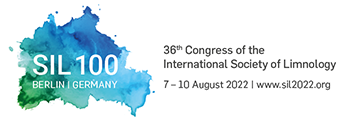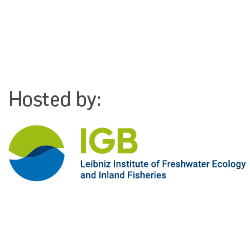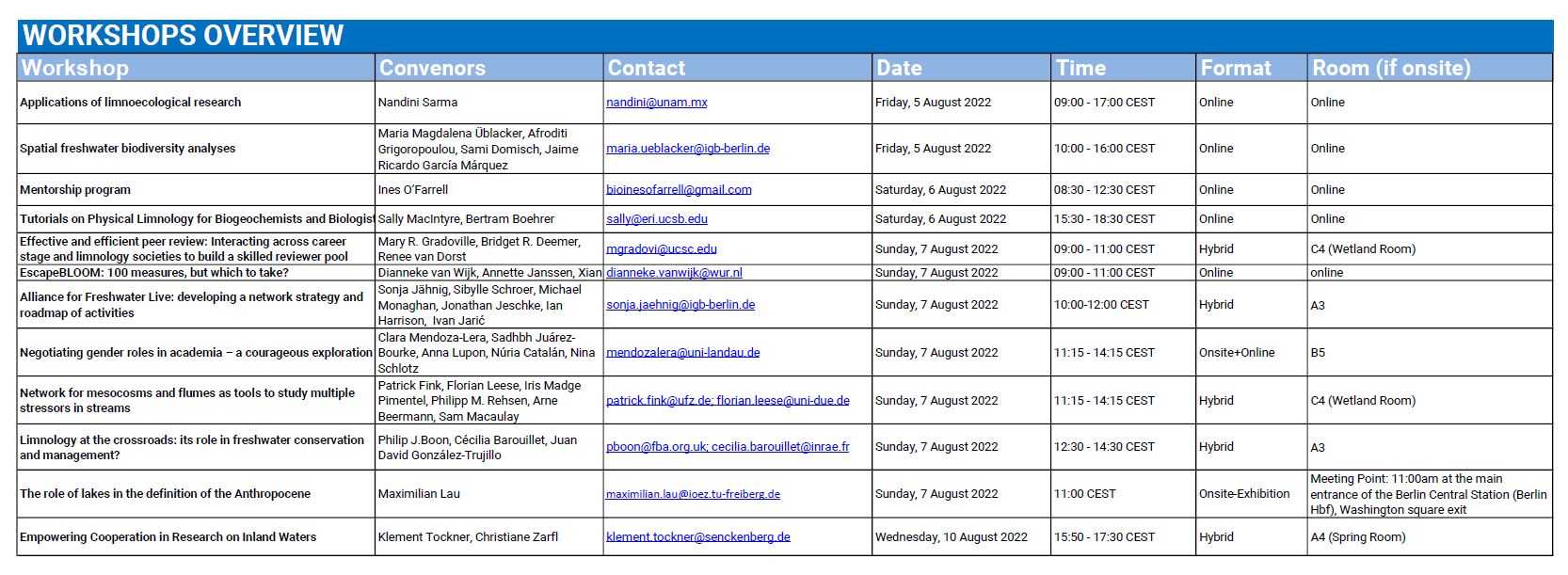WORKSHOPS
Are you registered for a workshop? Here you will find all information related to the workshops held before or during the SIL100 congress. Please contact the workshop convenor in case of any questions.
WORKSHOPS CATEGORIES
We offer a mix of Topical, Training and Society Interaction workshops and Special Events. The formats and tentative schedules can be found in the descriptions.
Training Workshops
Nandini Sarma
Universidad Nacional Autónoma de México, Mexico, nandini@unam.mx
Date: Friday, 5 August 2022
Time: Full Day
Format: Online
During this workshop we will highlight important aspects of limnology and aquatic ecology which can serve the students and the community; especially with respect to live food culture for fish farming, analyses of water quality and ecotoxicology. Live food farming is a fundamental part of fish culture. Planktonic communities in lakes, reservoirs, and wetlands, on which fish primarily depend, are dominated by algae and cyanobacteria (phytoplankton), and by rotifers, cladocerans, and copepods (zooplankton). These are significant in the transfer of energy from lower trophic levels (such as bacteria, detritus and phytoplankton) to higher levels. Rotifers and cladocerans, being smaller and less elusive than copepods, are important constituents of the diet of fish, particularly during the larval stages. In ecotoxicological studies rotifers and cladocerans are used extensively as bioassay organisms for the derivation of mean lethal concentrations of a wide variety of toxicants. These organisms are particularly useful as they are sensitive indicators, have a short lifespan, are easy to maintain under laboratory conditions, and are parthenogenetic during most of their life cycle, thereby exhibiting low intraspecific variability and allowing higher accuracy of the results. During the course we will present lectures on the following topics 1.Identification of zooplankton species with emphasis on species with application as live food or bioassay organisms. 2. Large scale plankton culture techniques. 3.Design of simple predation experiments to improve survival of larval fish. 4. Ecotoxicology with emphasis on xenobiotics and cyanotoxins. 5. Analysis of water quality using zooplankton indicators and water quality indices.
Mary R. Gradoville
University of California, United States, mgradovi@ucsc.edu
Bridget R. Deemer, United States Geological Survey, United States, bdeemer@usgs.gov, Renee van Dorst, Leibniz Institute of Freshwater Ecology and Inland Fisheries, Germany, renee.van.Dorst@igb-berlin.de
Date: Sunday, 7 August 2022
Time: Morning
Format: Online or Hybrid
Scholarly peer review is an essential part of the scientific process, yet many early career researchers (ECRs) enter the role of referee without prior training. At this interactive workshop, we will present and discuss strategies for conducting effective, time-efficient review. A previous workshop hosted by the Association for the Sciences of Limnology and Oceanography (ASLO), a complementary limnological society, showed that many ECRs have a strong interest in reviewing but are unsure of their qualifications to review and desire further training. Here, we provide peer review tips and tricks from editors of both ASLO and SIL, fostering interactions among scientists of diverse career stages and between limnological societies. Specifically, we will discuss the results of a survey of ASLO editors regarding their process for choosing reviewers, what qualifies one to review, what makes a review helpful, and strategies for conducting a review. We will convene a panel of experienced peer reviewers to foster discussion on these topics, with a special focus on handling peer review of English-as-a-second-language (ESL) manuscripts. Challenges regarding ESL submissions have emerged as a key concern in previous workshops and are especially relevant for international society journals like SIL and ASLO. The most valuable output from this workshop will be instilling confidence in ECRs regarding their reviewing skills. Additionally, we hope to disseminate key takeaways from this discussion in an accessible format, such as a SIL news piece, and to brainstorm ways to connect associate editors with the emerging ECR pool.
Maria Magdalena Üblacker
IGB-Leibniz Institute of Freshwater Ecology and Inland Fisheries, Germany, maria.ueblacker@igb-berlin.de
Afroditi Grigoropoulou, IGB-Leibniz Institute of Freshwater Ecology and Inland Fisheries, Germany, afroditi.grigoropoulou@igb-berlin.de, Sami Domisch, IGB-Leibniz Institute of Freshwater Ecology and Inland Fisheries, Germany, sami.domisch@igb-berlin.de, Jaime Ricardo García Márquez, IGB-Leibniz Institute of Freshwater Ecology and Inland Fisheries, Germany, jaime.marquez@igb-berlin.de
Date: Friday 5 August 2022
Time: Morning
Format: Online
Freshwater habitats are strongly characterized by the connectivity among water bodies, yet this unique feature is often neglected in freshwater biodiversity analyses. In this interactive workshop we will focus on species geographic data and how this can be linked to a high-resolution hydrographic network to append spatially explicit attributes regarding connectivity, network topology, environmental data, and other infrastructures (e.g. dams, barriers). We will provide a full workflow starting with raw GPS data and use a suite of open-source tools including GRASS-GIS, GDAL, and R to (i) attach occurrence points to the closest stream reach, (ii) determine the upstream catchment area where the occurrence points are located, (iii) estimate statistics of different environmental factors such as mean temperature or land cover proportions within these sub-catchments, (iv) derive network topological characteristics, and (v) calculate the connectivity across occurrence points and the distance to dams. Finally, (vi) we will run a simple species distribution model to project the suitable habitat of a given species across the study region. We will use command-line GIS programming within the R environment, hence a good knowledge of R and the concepts of spatial (raster and vector) data is considered a pre-requisite to maximize the benefit of attendance. All code and data will be openly available such that participants can tune the tools on their data after the workshop.
Sally MacIntyre
University of California Santa Barbara, United States, sally@eri.ucsb.edu
Bertram Boehrer, Helmholtz-Zentrum für Umweltforschung GmbH – UFZ, Germany, bertram.boehrer@ufz.de
Date: Saturday, 6 August 2022
Time: Afternoon
Format: Online
The ecological functioning of lakes depends on the interactions between the physical processes that cause stratification and transport, both in the vertical and horizontal, and the nutrients, dissolved gases, plankton and other particulates which interact within this framework. Accurate assessment of controls on changes in temperature, thermal structure and oxygen content, water quality, plankton productivity, and metabolism with changes in land use, introduced species, and climate require an in depth knowledge of these processes. Programs in limnology benefit from training in all areas of limnology, yet physical limnology is often neglected. The goals of this workshop are to provide a knowledge of fundamentals in key aspects of physical limnology for biogeochemists and biologists. Topics to be covered include processes that lead to stratification, mixing and horizontal transport by convective motions, mixing and horizontal transport by shear driven motions and internal waves, pathways of incoming stormwater, gases in lakes, gas exchange across the air-water interface, advances in instrumentation, and hydrodynamic modeling.
Society Interaction Workshops
Sonja Jähnig
Leibniz Institute of Freshwater Ecology and Inland Fisheries (IGB), Germany, sonja.jaehnig@igb-berlin.de
Sibylle Schroer, Leibniz Institute of Freshwater Ecology and Inland Fisheries (IGB), Sibylle.Schroer@igb-berlin.de, Michael Monaghan, Leibniz Institute of Freshwater Ecology and Inland Fisheries (IGB), Michael.Monaghan@igb-berlin.de, Jonathan Jeschke, Leibniz Institute of Freshwater Ecology and Inland Fisheries (IGB), Jonathan.Jeschke@igb-berlin.de, Ian Harrison, Conservation International, iharrison@conservation.org, Ivan Jarić, Czech Academy of Sciences – Institute of Hydrobiology, ivan.jaric@hbu.cas.cz
Date: Sunday, 7 August 2022
Time: Morning
Format: Online or Hybrid
The five pillars of the “Alliance for Freshwater Life: Understanding, valuing, and safeguarding freshwater biodiversity” (https://allianceforfreshwaterlife.org/) will provide the framework for discussions to further develop a sustainable network strategy. In an interactive format (e.g. world café), we plan to create roadmaps of activities and milestones for the five pillars. (1) Research: The need for scientifically robust guidance on the functioning and management of freshwater species and ecosystems has never been greater. Which global research gaps are holding back our ability to halt freshwater biodiversity that could be closed by a global community – and how? (2) Data & Synthesis: Accessible data are needed to effectively exchange information between science, policy, management and the public. How can we make existing data more accessible and integrative? (3) Conservation: Despite the commitment of many governments in international policies, the rate of decline in freshwater species is tremendous. How can conservation efforts and interactions of different initiatives be strengthened to contribute to ongoing policy commitments? (4) Education & Outreach: Large-scale awareness and participation of the public are critical prerequisites for reaching a broader public and stakeholder audience. How can awareness and funding strategies be tailored to the needs of freshwater conservation and management? (5) Policy: We need to engage with policy-makers to build awareness for the specific needs of freshwater species and ecosystems. How can we step up to implementing environmental protection regulations tailored to the needs of freshwater issues?
Ines O’Farrell
VP for Developing Countries, Argentina
bioinesofarrell@gmail.com
Date: Saturday, 6 August 2022
Time: Morning
Format: Online
This workshop aims to introduce the SIL Mentorship program to the limnological community, but specially to students and early career limnologists and experienced scientists willing to contribute and support young scientists from developing countries. In the workshop current mentors and mentees from different countries will exchange their experience and present their advances and proposals. This workshop will be an excellent opportunity to further increase continual engagement within SIL members in order to foster a dynamic international community.
Clara Mendoza-Lera
University of Koblenz-Landau, Germany, mendozalera@uni-landau.de
Sadhbh Juárez-Bourke (Facilitator) www.connecting-academia.com, s.juarez.bourke@gmail.com, Anna Lupon, Center for Advanced Studies of Blanes (CEAB-CSIC), Spain, anna.lupon@gmail.com, Núria Catalán, Laboratoire des Sciences du Cimat et de l’Environement (LSCE-CNRS), France, ncatalangarcia@gmail.com, Nina Schlotz, Technische Universität Berlin, Germany, nina.schlotz@tu-berlin.de
Date: Sunday, 7 August 2022
Time: Morning
Format: Online or Hybrid
Despite Academia becoming more diverse and offering more opportunities across genders, our gender imbalance is far from resolved. This workshop is an invitation to explore our gender roles, not from our usual intellectual perspective, but from the knowledge of our body, which holds our lived experience. Through iterative cycles of listening – to ourselves and each other – through physical expression, sensing, and reflexivity, we delve into a deep exploration about what it means to be a man, a woman (and everything in-between) in today’s academic world. The workshop is an invitation to witness each other’s reality when it comes to gender roles, with empathy, compassion and humor, regardless of our gender, political inclinations or personal convictions. The workshop has four parts facilitated by Sadhbh Juárez Bourke who is a trans-cultural facilitator, cultural coach, and sustainability expert. First the embodied method is introduced through playful exercises. Second, we explore our gender identity within academia. Third, we explore our path until today with its achievements and challenges. Finally, we dive into what we want to go towards: how would it feel like to be a free human in academia. We close the session with a joint reflection.
Topical Workshops
Klement Tockner
Senckenberg Society for Nature Research, Germany, klement.tockner@senckenberg.de
Christiane Zarfl, Universität Tübingen, Environmental Systems Analysis, christiane.zarfl@uni-tuebingen.de
Date: Wednesday, 10 August 2022
Time: Afternoon
Format: Online or Hybrid
Science has always been an international endeavor, and cooperation across disciplinary, geographic and institutional borders is a critical driver for how science – at least how excellence in science – is done. However, research is drifting apart and becomes more and more unbalanced and uneven, with a predominance by wealthy countries in a Global North including a shift towards SE Asia. Long-term cooperation (e.g. 10+ years), cooperation on an equal footing, mutual capacity building, and the open exchange of data and information are considered fundamental principles of fruitful and sustainable South-North cooperation. We urgently need to strengthen South-North cooperation in order to understand the complex interdependencies of inland waters and to create a safe and just corridor for our planet and for humankind. Hence, the workshop invites people, in particular early career researchers, to discuss fundamental principles of and to provide specific measures required to maintain and extend international cooperation.
Dianneke van Wijk
Water Systems and Global Change Group, Wageningen University & Research, The Netherlands, dianneke.vanwijk@wur.nl
Annette Janssen, Water Systems and Global Change Group, the Netherlands, annette.janssen@wur.nl, Xiangzhen, Kong, Helmholtz-Centre for Environmental Research – UFZ, Germany, xiangzhen.kong@ufz.de
Date: Sunday, 7 August 2022
Time: Morning
Format: Online
Prof. Clearwater receives a pressing phone call: “There is a lake with a harmful algal BLOOM. You have to find a solution within one hour! Because otherwise the fish for today’s dinner will die and you will be fired!” Luckily he knows 100 solutions to get lakes clean again! But which one to choose? You will help Prof. Clearwater on his quest for the right solution. We puzzle our way into the depths of the lake, try to use the power of ecological models and find the best way to save the lake. But time is limited… Which team will find the solution within one hour? This workshop forms a unique opportunity to explore current advances in lake modeling and suitable ways to link models to lake water quality management. Besides, the workshop offers a fun way to get to know other SIL participants. We plan to organize the workshop by grouping attendants into sub-groups and work on puzzles for lake bloom mitigation within an ‘Escape room’ setting, and end the workshop with a plenary discussion and reflection with all groups.
Philip J.Boon
The Freshwater Biological Association, United Kingdom, pboon@fba.org.uk
Cécilia Barouillet, INRAE CARRTEL, France, cecilia.barouillet@gmail.com
Juan David González-Trujillo, Museo Nacional de Ciencias Naturales, Spain, jdgonzalezt@mncn.csic.es
Date: Sunday, 7 August 2022
Time: Morning
Format: Online or Hybrid
The field of limnology is multidisciplinary in essence. Thanks to this multidisciplinary dimension, limnological studies have been able to tackle complex and pressing ecological questions related to the growing environmental and human pressures on freshwater ecosystems. From improving our understanding on the extent and cause of environmental stressors to finding solutions to mitigate the impact of these stressors, limnologists have helped to improve our understanding and stewardship of inland waters. During this session, we will discuss how we can improve our communication to demonstrate the role of limnology in tackling important inland management and conservation issues. We aim to trigger a discussion on how we can improve and adapt our research to further develop the field of limnology, the importance of which will continue to increase as human populations grow and place even greater demands on freshwater resources. We will also explore how limnologists can build on strategies to raise awareness around inland water conservation and management partly through the inspiration of successful stories from the field of oceanography.
Patrick Fink, Helmholtz Centre for Environmental Research – UFZ, Germany patrick.fink@ufz.de
Florian Leese, florian.leese@uni-due.de, Iris Madge Pimentel, iris.madge-pimentel@uni-due.de, Philipp M. Rehsen, philipp.rehsen@uni-due.de, Arne Beermann, arne.beermann@uni-due.de, Sam Macaulay, samuel.macaulay@zoo.ox.ac.uk
Date: Sunday, 7 August 2022
Time: Morning
Format: Online or Hybrid
Mesocosms are powerful experimental tools that combine the (near) natural conditions of field studies with the experimental control of laboratory investigations. Various sizes and types of mesocosms are used worldwide to study how physical, chemical and biotic conditions regulate stream ecosystems, and in particular to investigate the effects of multiple stressors.
This workshop will bring together the global limnological community working with stream mesocosms, with a focus on multiple stressor research. Several such initiatives exist already, that will be connected synergistically, rather than competitively. The workshop has three main aims:
1) Networking: Researchers working on different types of stream mesocosms, research questions, stressors, eco-regions, and study organisms will meet and exchange ideas and challenges.
2) Developing guidelines: Different types of experimental mesocosm systems are tailored for specific questions and thus come with specific strengths and weaknesses (trade-offs). We aim to develop a framework for choosing the appropriate system, scale and analysis for specific questions or stressors.
3) Building a platform: We aim to build an informal networking platform to work on joint concepts, papers and funding initiatives across scientific and geographic fields. One starting point could be a best practice paper on the optimal choice (and trade-offs) of stream mesocosm experiments for particular research aims and questions.
The workshop organizers will give a short impulse presentation, followed by discussion or breakout groups (depending on the number of participants) on selected topics and initiatives. Suggestions prior to the workshop are welcome and should be submitted to patrick.fink@ufz.de
Special Events
Maximilian Lau, maximilian.lau@ioez.tu-freiberg.de
Date: Sunday, 7 August 2022
Time: Morning
Format: Onsite – Exhibition
It has been widely acknowledged that we are living in the “Anthropocene”, the geological age shaped by humans. This year marks the possible transition of the Anthropocene as a concept to an official chrono-stratigraphic unit when it is decided what specific marker (or “golden spike”) in the geological record indicates its beginning. Among the sites and indices that are suggested, many are actually lake sediments.
Interestingly, Berlin is at the centre stage for this process, as a Berlin Institution, the HKW (Haus der Kulturen der Welt), hosts the concluding meeting of the International Commission on Stratigraphy on the subject in 2022. This meeting is followed by an exhibition that explores the development of the Anthropocene concept, displays the suggested stratigraphic materials and aims at bringing this discussion out of the geological community to a wider public.
In a SIL special event, we can visit this exhibition, “earth indices”, to reflect on the role of lakes and lake scientists in the definition of the Anthropocene and experience how our methods and findings aid in answering broad and planetary-scale questions.
The HKW is situated in the centre of Berlin, only a stroll away from the major political buildings including the Brandenburger Tor and the Bundestag. It is an interesting structure in itself. It hosts multiple exhibitions and a Spree-side restaurant. We meet 11:00 in front of the main train station (Berlin Hbf), the Washingtonplatz from which HKW is a 5 to 10-minute walk away. A tour through the exhibition and some time to discuss and reflect will end at 3pm, after which we could remain at the restaurant for a coffee or you conclude with a self-guided city tour through political Berlin and the Tiergarten (park).
Duration: 2-3 hours
Meeting point: Berlin Central Station (Berlin Hbf), Washington square exit
Entrance fee for the exhibition is 10.00 Euro per person; to be paid at the HKW.


